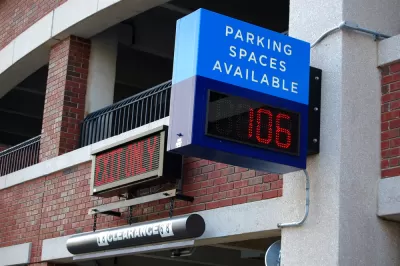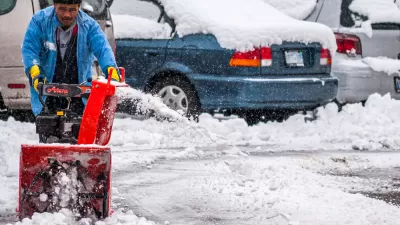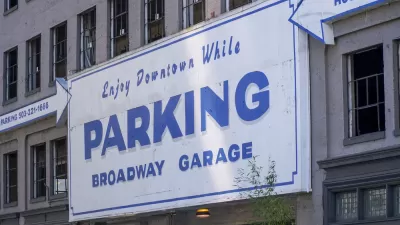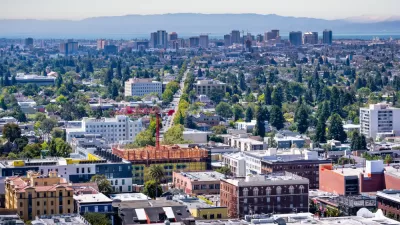The bill's author and housing advocates argue that easing parking requirements would ease the state's affordable housing crisis and promote the state's climate goals.

"It’s time to prioritize housing people over housing cars," argues the Los Angeles Times editorial board, writing in support of a new bill introduced by Assemblymember Laura Friedman (D-Glendale), which "would prohibit cities from requiring parking in developments within a half mile of a major transit stop or transit corridor." Under the proposed bill, builders can still provide parking, but blanket requirements would be eliminated.
"The state’s obsession with providing abundant parking means the cost of new construction, particularly for housing, is unnecessarily inflated." Assembly Bill 1401 "could help with two essential and sometimes overlapping goals: easing the housing crisis and reducing climate-warming emissions from vehicles."
"In some cities that are resistant to new development, stringent parking requirements are a de facto way of blocking higher-density multifamily housing and lower-income housing," encouraging the development of only high-end units that will give developers a higher return on their investment to make the project financially viable. According to one analysis, "building a parking structure added nearly $36,000 per unit." Easing parking requirements has had demonstrably positive effects on housing development. "Two decades ago, Los Angeles eased parking requirements to make it easier to convert old commercial buildings into apartments and condos. This adaptive reuse ordinance helped create nearly 7,000 units downtown by 2008."
Eliminating mandatory parking will also help the state reach its climate goals, the editorial board argues. "There’s simply no way California can meet its climate goals without slashing emissions from transportation." To reduce the need for private vehicles, "[i]t’s time to flip on its head the 'car is king' thinking that has shaped California’s development patterns for the last half-century."
In an op-ed published in Bloomberg CityLab, Assemblymember Friedman and UCLA Urban Planning professor and author of The High Cost of Free Parking Donald Shoup write that "[t]hese outdated planning policies make it difficult to build more multi-family homes within urban boundaries, fueling an unprecedented housing shortage that is entirely artificial in origin." Although they acknowledge that "parking reform isn’t a silver bullet to solve these problems, it is a vital ingredient — and one that’s already gaining traction: Many cities in California have already made the leap to break free from the high cost of 'free' parking." However, "these harmful requirements remain in place in most cities, reinforcing the need for statewide action to address California’s climate, transportation and housing challenges."
FULL STORY: Eliminate parking requirements: Housing people is more important than housing cars

Study: Maui’s Plan to Convert Vacation Rentals to Long-Term Housing Could Cause Nearly $1 Billion Economic Loss
The plan would reduce visitor accommodation by 25,% resulting in 1,900 jobs lost.

North Texas Transit Leaders Tout Benefits of TOD for Growing Region
At a summit focused on transit-oriented development, policymakers discussed how North Texas’ expanded light rail system can serve as a tool for economic growth.

Why Should We Subsidize Public Transportation?
Many public transit agencies face financial stress due to rising costs, declining fare revenue, and declining subsidies. Transit advocates must provide a strong business case for increasing public transit funding.

How to Make US Trains Faster
Changes to boarding platforms and a switch to electric trains could improve U.S. passenger rail service without the added cost of high-speed rail.

Columbia’s Revitalized ‘Loop’ Is a Hub for Local Entrepreneurs
A focus on small businesses is helping a commercial corridor in Columbia, Missouri thrive.

Invasive Insect Threatens Minnesota’s Ash Forests
The Emerald Ash Borer is a rapidly spreading invasive pest threatening Minnesota’s ash trees, and homeowners are encouraged to plant diverse replacement species, avoid moving ash firewood, and monitor for signs of infestation.
Urban Design for Planners 1: Software Tools
This six-course series explores essential urban design concepts using open source software and equips planners with the tools they need to participate fully in the urban design process.
Planning for Universal Design
Learn the tools for implementing Universal Design in planning regulations.
City of Santa Clarita
Ascent Environmental
Institute for Housing and Urban Development Studies (IHS)
City of Grandview
Harvard GSD Executive Education
Toledo-Lucas County Plan Commissions
Salt Lake City
NYU Wagner Graduate School of Public Service





























